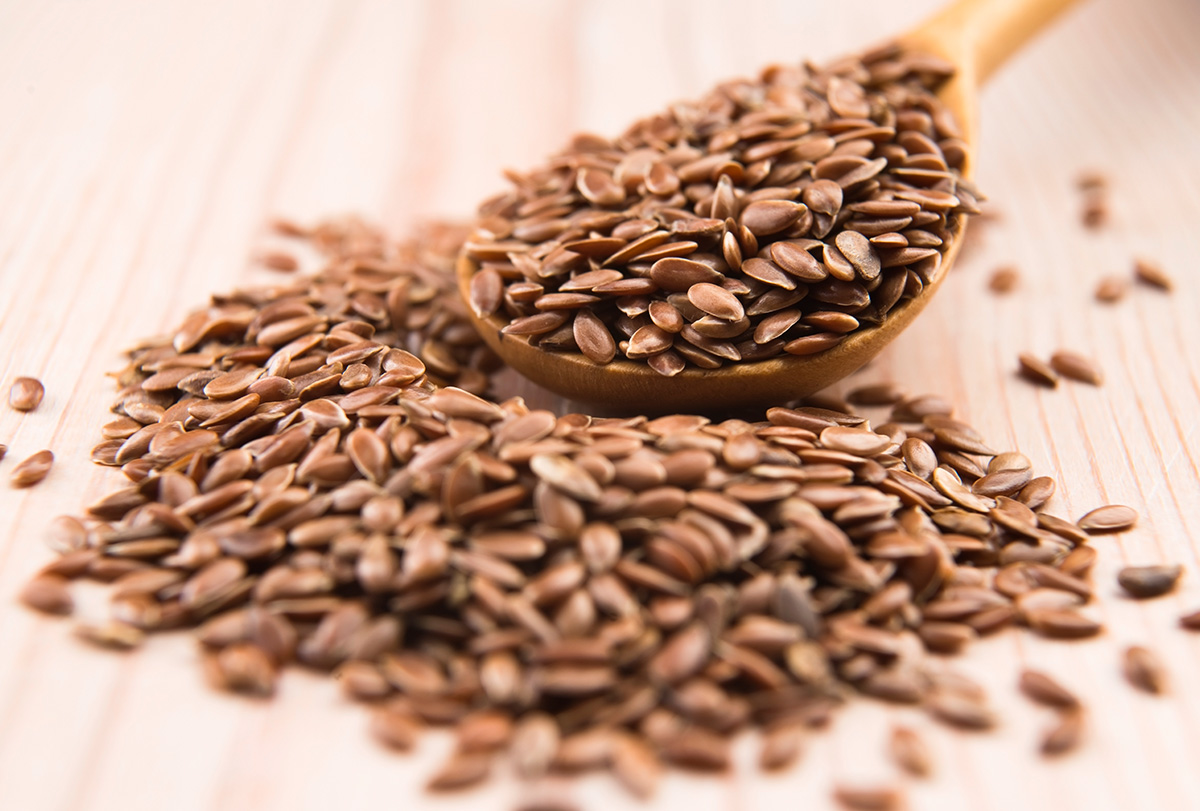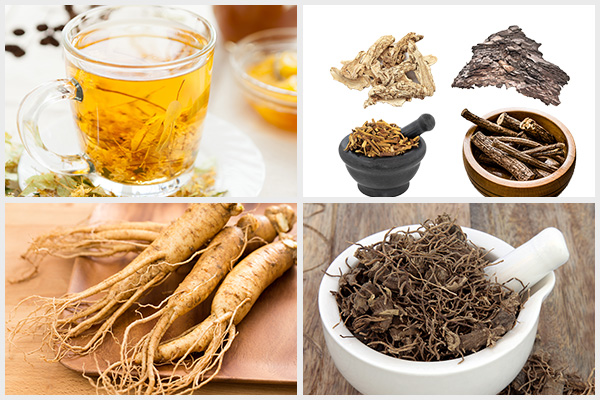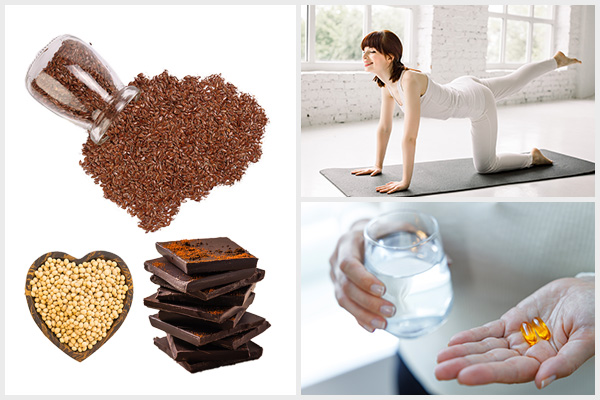In this article:
Home remedies can be a helpful way to manage menopausal symptoms, especially for women who prefer a more natural approach or wish to avoid or reduce their use of medication.

Some common home remedies for the relief of menopausal symptoms include dietary modifications, herbal therapies, and lifestyle modifications such as regular workouts, stress management strategies, and relaxation practices.
While these remedies may not eliminate all symptoms of menopause, they can be a safe and effective way to reduce their severity and improve overall well-being.
It is essential to communicate with a healthcare provider before beginning any home remedies, particularly if you already suffer from a medical issue or are on medication.
Home Remedies for Menopausal Symptoms
Here are some home remedies you can try to relieve the symptoms of menopause.
1. Jump on the herb train
The following herbal remedies can help provide relief from menopausal symptoms.
a. Drink herbal teas
Linden, rosehip, daisy, green tea, and sage are among the herbs that have been traditionally used to manage hot flashes and other menopausal symptoms.
Linden tea
Linden (Tilia spp.) is a tree that produces fragrant flowers that have been used in herbal medicine for centuries. Linden tea is known for its relaxing and calming properties and has been used to help manage hot flashes and other menopausal symptoms. (1)(2)
Rosehip tea
Rosehip is the fruit of the rose plant (Rosa canina) and is rich in vitamins, minerals, and antioxidants. It has been traditionally used to support the immune system and is also believed to have anti-inflammatory properties, which may be beneficial in managing menopausal symptoms such as osteoporosis. (3)
Green tea
Green tea (Camellia sinensis) is a popular beverage that is filled with antioxidants and has been demonstrated to have a lot of health benefits, including reducing the lipid profile.
Some studies have also suggested that green tea may be useful in decreasing the frequency and harshness of hot flashes. (2)(4)
Sage tea
Sage (Salvia officinalis) is a plant that has been traditionally used to manage menopausal symptoms such as hot flashes and night sweats.
Sage contains compounds that may have estrogenic effects and has been shown to be effective in reducing the frequency and severity of hot flashes. (5)
b. Try Dang Gui Liu Huang Tang
Dang Gui Liu Huang Tang is a traditional Chinese herbal formula that has been used for centuries to treat various conditions, including menopausal symptoms.
The formula consists of several herbs, including Chinese angelica, Chinese foxglove root, amur cork tree bark, and honey-fried licorice root.
Studies have suggested that Dang Gui Liu Huang Tang may be effective in treating menopausal symptoms, including night sweats, hot flashes, anxiety, and dry mouth.
One study found that the herbal formula was adequate in lessening hot flashes and night sweats in menopausal females. (2)(6)(7)
c. Chew ginseng or drink ginseng tea
A study aimed to systematically review the existing evidence on the efficacy and safety of ginseng for menopausal women’s health care. The authors reviewed trials that investigated the effects of ginseng on menopausal symptoms, such as hot flashes, mood disturbances, and sexual dysfunction.
They found that ginseng showed promise in reducing hot flashes and improving mood in menopausal females. The authors also noted that ginseng may have potential side effects, including insomnia and gastrointestinal disturbances.
Overall, the study suggested that ginseng may be a potential option for menopausal women’s health care, but more high-quality research is needed to confirm its efficacy and safety.
Ginseng is obtainable in powdered, dried, or fresh root form that can be boiled with water and consumed as tea. (8)

d. Try black cohosh root extract
According to a study, black cohosh appears to reduce vasomotor, psychiatric, physical, and sexual symptoms during the 4 and 8 weeks of treatment in menopausal women. The treatment group exhibited substantial improvement, with no reported side effects.
Therefore, black cohosh may have potential benefits in alleviating menopausal symptoms, although further research is needed to confirm its effectiveness. (9)
Note: Take black cohosh in the form of standardized extracts, capsules, or tablets, as directed by your healthcare provider.
2. Try dietary interventions
Here are some dietary interventions to manage menopausal discomfort.
a. Include flaxseeds in your diet
In a study that included menopausal women with bothersome hot flashes who were given 40 grams of crushed flaxseeds daily for 6 weeks, flaxseed significantly reduced the frequency and severity of hot flashes. (10)
Thus, flaxseed may be a viable option for women looking for a natural approach to managing hot flashes. All you have to do is add around 40 grams of flaxseed to your yogurt or smoothie. (10)
It’s worth noting that more research is needed to confirm the effectiveness of flaxseed for managing hot flashes and to determine the optimal dose and duration of treatment.
b. Increase dietary intake of soy
A study investigated the effects of soy foods on osteosarcopenia (the coexistence of osteoporosis and sarcopenia) and obesity in postmenopausal women. The authors noted that soy foods are good sources of phytoestrogens (plant compounds with estrogen-like effects) that decrease the risk of osteoporosis by stimulating the formation of bones and diminishing bone resorption.
In addition, soy foods may help to prevent sarcopenia (loss of muscle mass and strength) by providing high-quality protein and promoting muscle synthesis. The authors also noted that soy foods may help to reduce the risk of obesity by promoting satiety and reducing the intake of high-fat, high-calorie foods.
Overall, the researchers concluded that soy foods may have a number of health benefits for postmenopausal women, including reducing the risk of osteosarcopenia and obesity. (11)
c. Eat dark chocolate daily
A study has shown that incorporating 10 g of chocolate with a 99% concentration of cocoa into the diet of females who suffer from menopause for 6 months could have a slight positive impact on their perception of health. (12)

3. Exercises to try
Try doing these simple exercises to manage and prevent menopausal discomfort.
a. Perform deep breathing exercises
There is evidence to suggest that relaxation techniques, including deep breathing, can be beneficial in reducing menopausal symptoms such as hot flashes, anxiety, and depression.
Deep breathing and other relaxation techniques help reduce sympathetic nervous system activation, which can lead to a reduction in the frequency and severity of hot flashes.
Several studies have reported the effectiveness of relaxation techniques in reducing menopausal symptoms. For example, a study found that women who practiced deep breathing exercises for 15 minutes twice a day experienced a significant reduction in the frequency and severity of hot flashes.
Overall, while relaxation techniques may not work for every woman, they can be a simple and noninvasive approach to reducing menopausal symptoms and may be worth considering for those seeking natural approaches to managing their symptoms. (13)(2)
b. Perform regular aerobic exercises
A study on menopausal women showed that a 12-week exercise program improved their quality of life, including physical functioning and mental health, and reduced symptoms such as hot flashes and insomnia. (14)
Exercise can also improve cardiovascular health, reduce metabolic risks, minimize weight gain, increase bone mass, reduce low back pain, minimize hot flashes, and improve mood.
Regular exercise is significant for maintaining good health during menopause, but it’s essential to talk with a healthcare professional before initiating any workout program, especially with preexisting health issues. (15)
4. Try supplementation
Take vitamin B supplements (after referring to a doctor)
Vitamin B is important for maintaining metabolism and the nervous system. Deficiencies in B vitamins during menopause can result in adverse health outcomes such as cardiovascular diseases, stroke, cognitive decline, and osteoporotic fractures.
Thus, adequate vitamin B intake can help menopausal women. Proper assessment and supplementation of vitamin B should be included in the medical care of women in menopause. (16)
Vitamin B-rich foods include: (17)
- Fish
- Liver
- Meat
- Eggs
- Shellfish
Most-Asked Questions About Menopause
What is perimenopause?
Perimenopause encompasses the years preceding and following the final menstrual period, which can vary in duration. Typically, the first signs of perimenopause include an increase in menstrual frequency followed by a decrease, but patterns can differ.
Pregnancy is still possible during perimenopause. (18)
What is premature menopause?
Early menopause, also known as premature ovarian failure, occurs when a woman stops having periods before the age of 40 due to nonmedical reasons such as smoking, living at high altitudes, and undernutrition.
Iatrogenic menopause, on the other hand, is caused by medical procedures such as oophorectomy, chemotherapy, pelvic irradiation, or any other intervention that affects the blood supply to the ovaries. (19)
When does menopause end?

Menopause is not a phase that ends. Once you get menopause, it continues for life.
Can menopause cause weight gain?
Yes, menopause often leads to weight gain. (20)
Can cold drinks help with menopause?
There is no clear evidence to suggest that cold drinks can directly help with menopause symptoms.
However, staying well hydrated is important for overall health, and drinking cold water or other cold beverages can provide temporary relief for hot flashes and night sweats in some people.
Final Word
Home remedies for menopause can assist in alleviating symptoms and promoting general well-being. However, do consult a healthcare provider before trying any new supplements or remedies.
 Continue ReadingMenopause: Causes, Symptoms, and Complications
Continue ReadingMenopause: Causes, Symptoms, and Complications
- Was this article helpful?
- YES, THANKS!NOT REALLY


